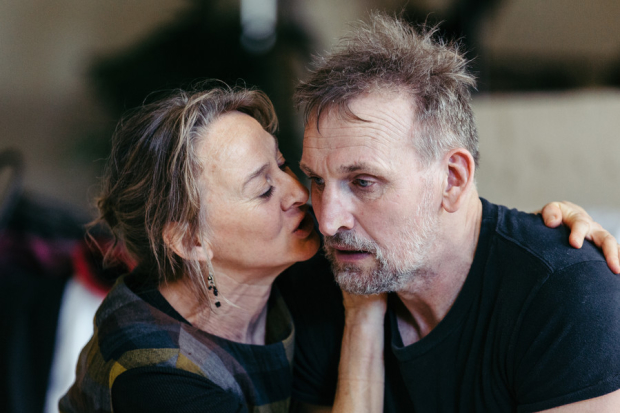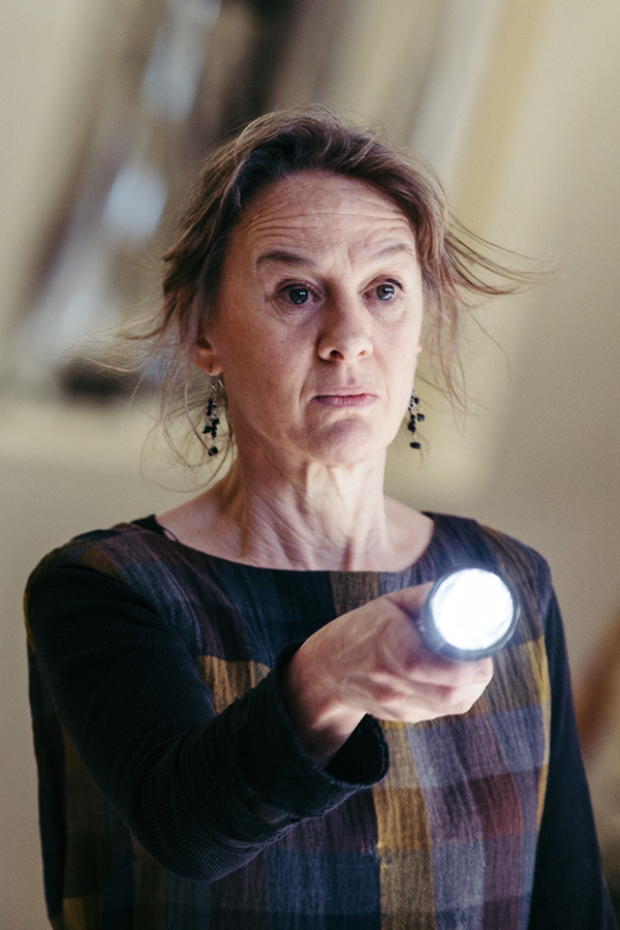Review: Macbeth (Royal Shakespeare Theatre)
Macbeth is on the A-level syllabus this year. This probably explains why our two biggest theatrical institutions the National Theatre and now the Royal Shakespeare Company have chosen to open the play within weeks of each other.
But pity the poor 17 year-olds trying to make sense of what they are seeing. A suitable subject might be "What is is about Macbeth that makes it so hard to stage in the modern age?" They’ll get A stars for that. Polly Findlay‘s production is as ruthlessly cut, modish, tricky and eccentric as the one Rufus Norris unveiled two weeks ago.
Its only marginal advantage in the inevitable compare and contrast is that it seems to have a stronger sense of what it is up to. At times, though, this feels like Macbeth the comedy, which is surely not what Findlay intended when she cast Christopher Eccleston (making his RSC debut) and Niamh Cusack as her bloodily ambitious pair.
Fly Davis' set is a mixture of the bold and the bizarre – a carpeted inner square, bare walls, a balcony and a water cooler where characters pause for a drop of refreshment. It is such a heavy-handed bit of symbolism that it made me want to scream. The characters wear modern dress, they seem to be in a modern conference centre. (The ghost that most strongly haunts this production is that of Ivo van Hove and his collaborators.)
Noticing the play’s obsession with time, and the way it stops for the Macbeths after they have slaughtered Duncan, Findlay sets centre stage a red-faced digital clock that counts down from that moment to Macbeth’s own death. In a smart end note, at the close, it starts again, as she suggests the circularity of the thirst for power. Huge projected quotes and words in capital letters "LATER" "FIFE" "NOW" are flashed up on the back wall, like slogans, to make her point.
She also underlines the terrible impact of the Macbeths’ lack of children. When Duncan’s court assembles, it does so in perfect family groups. Only Macbeth is alone. When Eccleston tells Cusack, "Bring forth men-children only", he does so with a catch in his voice and she collapses into his arms in tears. It is the best moment in the play.
Even the witches are children, three moppets in pink polka dot pyjamas and white pompom boots, who clutch bloody dolls and talk in unison. They clearly owe a debt to the twins in The Shining and the red-coated figure in Don’t Look Now. The vibe is generally horror. But that’s my problem with it. If Macbeth is just a horror story, then it isn’t a particularly good one; to strip it of its feeling, its equivocal moral sense is to reduce it so far it is hardly worth performing.
It is an approach that (once again) strands good actors. Eccleston has always wanted to play Macbeth and there is something really interesting about his ultra-macho soldier, who rolls and swaggers around the stage, confident in his world. When he assumes the crown, he sprawls in the black leather chair that serves as a throne, knowing how to take control and how to rule. Yet with Cusack, glamorous and febrile, skittering across the stage in slinky ballgowns, always on the move, a bundle of fierce, restless energy, he is cowed and uncertain. Her attacks on his masculinity cut deep.
But the production asks him to make all his monologues appeals to the audience. He wrenches the lines to make them fiercely unpoetic, external questions not internal musings. The fact that he has to deliver the great line "My life has fallen into the sere, the yellow leaf" while sitting next to the water cooler is an example of the exteriority of the entire approach. Cusack too suffers from an over-emphatic sleep-walking scene, that brings laughter not pity.
The Porter stays on stage throughout, clearing up with a carpet sweeper, interjecting wry comments (Michael Hodgson has a dry, downbeat delivery) and – unforgivably in my view – chalking up the death toll on the back wall, distracting from the moment when Edward Bennett‘s accountant-like Macduff is told about the death of his children. My irritation with that distracted me from one of Findlay’s better strokes: Lady Macbeth overhears their death on a recording, and it tips her into insanity.
Insights such as that make me wish that Findlay had just relaxed and let the play do a bit more work. Shakespeare has survived for a reason. You can make him contemporary and relevant without squeezing him into such a reductive concept. Year 13s, please discuss.
Macbeth runs at the Royal Shakespeare Theatre until 18 September before transferring to the Barbican in October.














